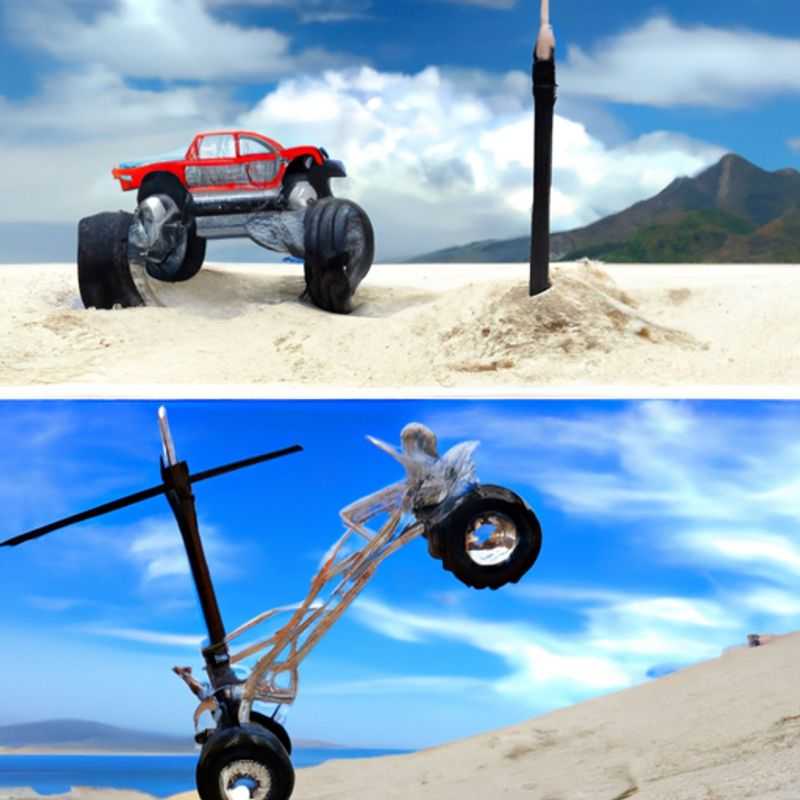8 Insider Tips for Buying the Perfect Suspension Kit for Your RC Car: Reviews That Really Matter

8 Tips for Navigating the Wild World of RC Suspension Kits: A Buyer's Guide
Alright, gearheads,

RC Car Compatibility: Decoding the Suspension Kit Mystery
You've got your eyes on upgrading your RC car's suspension, and that's great! But before you go throwing parts at it, you need to understand a few key things about your specific RC car model and its compatibility. Think of it like choosing the right shoes for a marathon: the wrong pair might make you trip, and the right ones might make you break records!
First, you need to identify your RC car's suspension system. It's crucial to know if it's independent or solid axle. This is like figuring out if your car has four wheels or just two axles. Independent suspension allows each wheel to move individually, while solid axle systems move as a unit. Once you've figured this out, you can move on to compatibility.
You'll want to make sure the suspension kit you choose is designed for your car's specific make and model. Like trying to fit a square peg in a round hole, mismatched kits won't work and could potentially damage your RC car. To be extra safe, check the kit's specifications and make sure they match the dimensions of your car's suspension. This might involve looking at things like shock length, spring rates, and overall mounting points.
Consider your budget. Suspension kits can range in price from $20 to $200 or even more depending on the brand, quality, and complexity. Don't be afraid to spend a bit more for high-quality parts; they will generally hold up better over time and provide better performance.

Suspension Kit Durability: How to Spot Quality and Avoid a Bumpy Ride
A sturdy suspension system is your car's backbone. It's what keeps you in control on rough roads and handles the bumps with grace. But how can you tell if a suspension kit is worth your hard-earned cash? There's a science to it, my friend.
Look for heavy-duty materials like steel and aluminum for the springs, control arms, and shock absorbers. These components are your car's shock absorbers and need to withstand a lot of stress.
Next, check the coatings. Powder coating or galvanizing can protect your suspension from the elements, prolonging its lifespan.
Don't forget about the warranty. A good suspension kit should come with a warranty, giving you peace of mind. This will cover you for any defects or premature wear and tear.
When it comes to durability, you get what you pay for. A reputable brand with a track record of quality is worth the investment. Think of it as an insurance policy for your ride.

Off-Road or On-Road? Choosing the Right RC Car Terrain
Choosing the right RC car for your terrain is key to a fun and successful experience. Think of it like picking the right shoes for a hike – you wouldn't wear flip-flops on a mountain trail, would you?
On-Road: If you're planning on racing on smooth surfaces like pavement or asphalt, an on-road car with slick tires is the way to go. These cars are built for speed and agility, and they can handle tight corners and quick turns with ease.
Off-Road: For conquering rough terrain, you'll need an off-road RC car. These cars are equipped with larger tires, extra suspension, and sometimes even four-wheel drive for tackling dirt, mud, and rocks. Look for models with high ground clearance and durable construction.
Rock Crawlers: These off-road specialists are designed for extreme crawling challenges. They have low gearing, heavy-duty suspension, and knobby tires that provide maximum traction on uneven terrain. They're like the SUVs of the RC world, ready for anything!
Dirt Track: For a mix of off-road and on-road fun, a dirt track RC car is perfect. These cars are built for speed on a variety of surfaces, including dirt tracks, sand, and grass. They have a good balance of power, handling, and durability.
Remember: Always check the manufacturer's recommendations for the type of terrain each RC car is designed for. This will help you choose the right car for your needs and ensure you have a blast out on the track!

Beyond the Hype: Unmasking the Truth with Multi-Platform Reviews
Are you tired of being swayed by slick marketing and want to know the *real* deal about a product? Look no further than customer reviews! They are your secret weapon to uncover the truth. But here's the catch: one platform isn't enough. Think of it like this, you wouldn't just ask one friend for restaurant recommendations, right? You need a diverse range of opinions.
So, where do you start? First, check the big players like Amazon, Walmart, and Target. Then, dive deeper into specialized sites like CNET for electronics, TripAdvisor for travel, or even Reddit for niche communities. The more sources you tap, the more balanced your picture becomes.
Now, don't get fooled by suspiciously perfect reviews. Be wary of suspiciously high ratings or reviews that are suspiciously short or vague. Look for detailed reviews that mention both pros and cons. And always, always consider the reviewer's background and potential biases. A seasoned tech reviewer might have different priorities than a casual user, for example.
Remember, customer reviews are a treasure trove of information, but like any treasure hunt, it requires a bit of sleuthing and a healthy dose of skepticism. So, dig in, and happy shopping!

Beyond Price: Why Manufacturer Reputation Matters
When buying anything, you want to trust the person or company selling it, right? The same goes for manufacturers! A good reputation means a manufacturer has a history of making quality products that people like. Think of it like this: if your friend loves a certain brand of shoes, you might be more likely to try them yourself. It's the same idea with manufacturers - a good reputation is like a recommendation from a friend.
You can find out about a manufacturer's reputation in a few ways. Look for reviews online, check out their website, or even ask friends and family if they've heard of the brand. You might also see awards or certifications that the manufacturer has received, which are like badges of honor showing they're doing a good job. If you're on the fence about a product, a manufacturer's reputation can be the deciding factor. It’s a little extra peace of mind that you’re getting a quality item.

Warranty and After-Sales Service: Don't Get Left in the Lurch!
Okay, folks, let's talk warranties and after-sales service. It's a bit like that hidden treasure map you find in your grandpa's attic - you never know what you're gonna find. But in this case, we're looking for peace of mind, not gold. Always check if your kit comes with a warranty, it's your insurance policy for any unexpected mishaps. Some kits offer a limited warranty, covering defects in materials or workmanship for a specific period. Others might offer extended warranties for an extra cost.
Then comes the after-sales service, which is like that helpful guide on your treasure hunt. Some manufacturers offer excellent support, with troubleshooting tips, repair options, or even replacement parts. Others might have a less robust system, leaving you to fend for yourself. Always read the fine print to understand what's covered, how long the warranty lasts, and what the process is if you need to make a claim.
Think of it this way: a good warranty is like having a compass on your treasure hunt. It helps you navigate any unexpected detours. And a great after-sales service? Well, that's like a treasure map that leads you directly to the gold. Happy hunting!

Price Wars: A Shopper's Guide to Comparing Prices Across Online Stores
You're in a hurry, looking for the best deal, and you need a quick and easy way to compare prices on different online stores. Don't worry, you've come to the right place! There are several tools and websites available that can help you find the best price for just about anything you can imagine. The best part is that most of these tools are free! They use clever algorithms to scour the internet, finding the best deals from a variety of retailers, and presenting them all in one place.
How do these price comparison tools work? Well, they use a sophisticated web crawler that scans the web for product information, including prices and availability. Once they have collected all of this information, they organize it so that you can easily compare prices from different retailers. Some of these websites even allow you to filter your search by specific criteria, such as brand, features, and even shipping costs. This helps you narrow down your search and find the best deals quickly.
Is there a catch? Well, you should always be aware that some of these comparison sites might be paid by the retailers they list. This means that they might receive a commission for directing you to a specific retailer. It's important to be aware of this, but don't let it deter you from using these tools. You can still get a good deal by comparing prices across multiple sites.
So, how do you choose the best price comparison website for you? Well, it depends on your needs. Some sites specialize in specific product categories, while others offer a more general approach. Check out the sites and see which one you like best. You can also find reviews of different price comparison tools online. And remember, the most important thing is to compare prices across multiple sites before making a purchase.

Suspension Kit Installation: A Guide to Ease and Effort
Suspension kits can be a significant upgrade for your vehicle, but don't let the installation process intimidate you. Ease of installation varies greatly depending on the kit and your mechanical skills.
Basic kits often involve straightforward bolt-on replacements. These might be doable in your driveway with basic tools and some DIY experience. More complex kits, like those with adjustable components or coilover setups, could require specialized tools, more time, and potentially a professional mechanic's expertise.
Always consult the kit's instructions for specific requirements and consider your skill level honestly. If you're unsure, seeking professional installation might be the safest and most efficient option. DIY costs primarily involve the kit itself and any additional tools you might need. Professional installation fees can vary widely depending on location and complexity.
